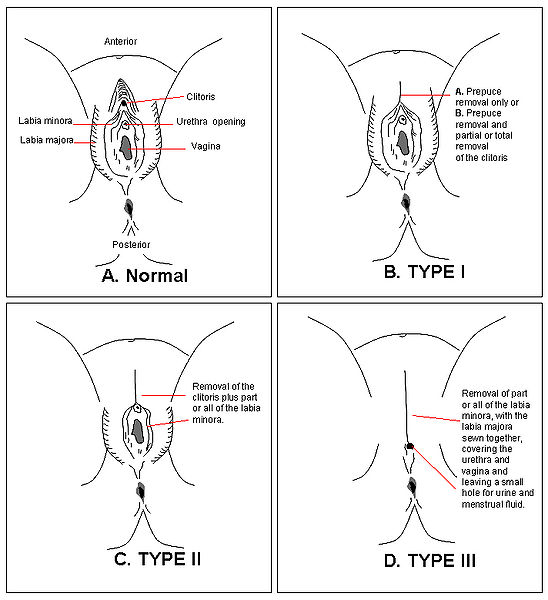Consequences of excision
The first consequence, when the excision occurs at an age 5-year-old superior, age in which the memories are stored in the memory, it is the reliable loss in the circle of acquaintances, mostly in the mother. So formula a young lady having been excised: " the worst, it is not the pain, it is to know that my mother lied to me, deceived me. She said to me that we went to a holiday, to visit an aunt. I was never able to rely on her since".
Another consequence of the excision is the memory of the pain in this place of the body which entails a fear, even a phobia of the contact at the level of the vulva. The apprehension at the idea of imagining a contact is sometimes enough to entail a pain. Therefore, an important number of excised women suffers from vaginisme, the impossibility to be able to support a sexual penetration, even when their anatomy would allow it. The memory of the physical pain is so present as it entails an important increase of the anxiety in the slightest approach and the contraction reflex of the muscles of the perineum which tightens very hardly the vagina and forbids then the penetration.
For the young ladies living in France who are confronted with the other not excised young ladies, the feeling not to be a woman as the others dominates. " I am not a complete woman " can express an excised woman.
Others think that it will be impossible to them to meet a man who will accept a woman not as the others. They imagine that the life of couple is impossible for them because of this excision. They think they cannot be desirable, they loved as they are.
The excision can also take away from the family. Indeed, if certain families evolved and decided not to excise the last girls of the sibship, the others stay on their position and think that the excision is an excellent thing matter. A young lady living in France and understanding another sound of bell can go away from her family, from her sisters, her friends, her mother, because she cannot speak about what worries herknowing that it will be very badly received to criticize the "traditions". It is something extremely difficult for the African young ladies for whom the family is very important. Moreover, the majority of these young ladies say, whatever is the situation: " I do not want it to my family to have made me excise, because I know that they indeed thought of making .It is because of the ignorance, not because of the lack of affection or will to hurt me ".
In a certain number of cases, the excised women have the feeling that their mutilation is something horrible about whom(which) nobody wants to speak. Indeed, numerous are the women who tell that their gynecologist examined them, even delivered, been looked after, but has never said a word on their excision. Nevertheless, all wait for a professional word on the subject and are shocked that we do not speak to them about it, a little as if it was about something unspeakable.

/https%3A%2F%2Fstorage.canalblog.com%2F02%2F59%2F391704%2F19786541_o.jpg)
/https%3A%2F%2Fstorage.canalblog.com%2F76%2F32%2F391704%2F19786241_o.jpg)







